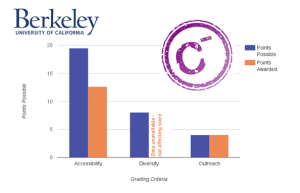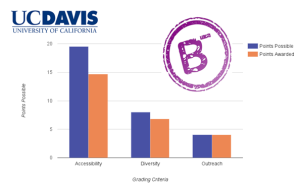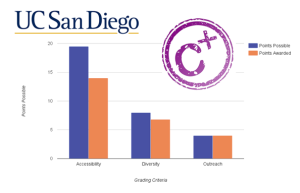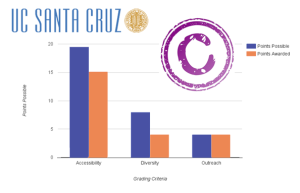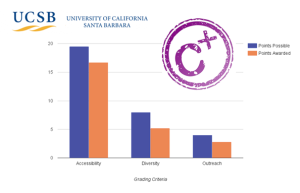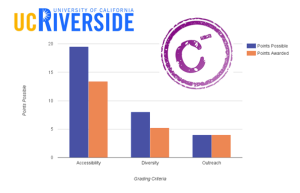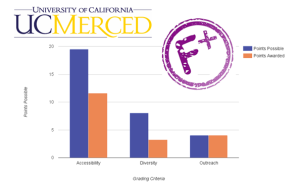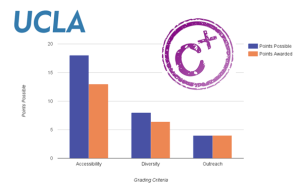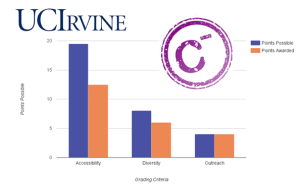Important: UCSA encourages students with urgent mental health concerns to seek help from on-campus services.
As a part of the #HowAreYou campaign, UCSA conducted evaluations for student mental health services at all nine undergraduate UC campuses. Each campus received a grade based on responses from both professional staff and students to questions regarding their counseling services. The average grade for all nine campuses was a C.
Below is a breakdown of each campus’s score and the methodology used to evaluate services.
Message from Undergraduate Committee leadership Mohsin Mirza and Sam Alavi
When we started brainstorming in September about what we wanted this two-year campaign to look like and accomplish, we realized that the first step was to assess the current programs on each campus. On the UCSA website, we have “Higher Education Report Cards” where our legislators get grades based on the bills they support or don’t support that impact UC students. It helps us hold lawmakers accountable and reminds them that we are noticing their actions and are impacted by them. While our administrators are not elected officials, they are still responsible for ensuring our safety and health. The goal of the #HowAreYou mental health grades was to make a statement both about what campuses are doing right in terms of mental health services, and what we still need to improve on. The grades were published publicly so that students and administrators can come together collectively to advocate for the improvement of services.
We have received a huge amount of feedback from students thanking us for the #HowAreYou campaign. Since the grades have come out, we have been approached by students from all over the UC, saying that the grades validated their frustration with counseling services, and gave them hope for greater resources on our campus. Furthermore, quite a few Directors of Counseling Services across UC campuses have told us that they agree with the grades they got for their campus and appreciate our efforts to improve services and resources. Staff members working in the field of mental health at the UC have confirmed with us that the UC is structurally unable to provide adequate treatment for students. With the grades and forthcoming efforts with the #HowAreYou campaign, we look forward to working with all parties involved to improve the structure of counseling services.
Despite our call for the improvement of services and publication of the grades, we want to remind students that they should still seek counseling services when needed. Just because the average of grades was a C across the UC, does not mean that you will get a C quality counselor when you go. The grades measured access, diversity, and outreach, which can all improve. It has been a pleasure working with counselors and counseling services Directors across the UC to improve mental health services, and we hope that students do not view this as a final assessment of counseling services, but instead a call for action amongst students, staff, and administration to increase the urgency around the mental health needs of students. We recognize that there are many improvements in the works regarding the hiring of counselors across the UC, and we look forward to further conversations about how to improve the diversity, accessibility, and outreach of counseling services.
Campus Grades
Each campus was given a grade A-F based on questions relating to three service areas: accessibility, diversity of staff, and outreach to students. Counseling centers are encouraged to reflect on this grade to make improvements in each of these areas. *A clarifying note regarding UC Merced: The researchers acknowledge that many of the issues in these three service areas are also complicated by their location in the Central Valley, which lacks the quality mental health resources off-campus that other schools may readily access.
Methodology
The study was conducted between September 2015 and February 2016 by the UC Student Association (UCSA). All nine undergraduate campuses at the University of California participated in evaluations.
When possible, student researchers met in person with Counseling and Psychological Services (CAPS) Directors. Alternatively, student researchers met with another CAPS staff member or corresponded with a CAPS representative over email. CAPS staff were asked to answer seventeen questions evaluating the services provided at their centers (see “Evaluation Questions” below).
The questions address three areas of service, as defined below:
- Accessibility – the ability to receive prompt care in a safe and comfortable environment
- Diversity – how accurately the skill sets and identities of CAPS staff reflect the demographics of the student body
- Outreach – proactive efforts by CAPS to circulate information about services to the campus community
The questions combined to form a total score of 31.5 points (19.5 points for accessibility, 8 points for diversity, and 4 points for outreach). The following questions received the most weight in the final score: 1, 4, 12, and 13. These questions address Tier 1 and 2 services, or services which the UC defines as priorities, as well as two main focus areas of the study (accessibility and diversity). Tier 3 services regarding outreach were considered but did not receive extra weight. The following questions were considered for context in order to get a full picture of CAPS services, but not calculated as part of the grade: 7, 8, 15, and 17.
In two cases, representatives at UCLA and UC Berkeley did not have available data or were otherwise unable to answer questions regarding a particular service area. Their total scores were adjusted to not be positively or negatively affected by these questions.
The same questions were asked of students to garner an understanding of how opinions might be different between providers and patients. Students who participated in the study either currently use CAPS, have tried to use CAPS and decided to seek care elsewhere, or are involved in student mental health advocacy work. In instances where CAPS and students answers differed, the average of responses was taken as the final input.
Evaluation Questions
- What is your Full Time Employee/Student ratio for CAPS?
- What is the average waiting time for an initial appointment?
- What is the average waiting time for follow-up appointments?
- Is there a limit on the number of CAPS sessions a student can receive per quarter/semester? If so, what is it?
- What percentage of students are referred out to outside counseling services?
- What is the average time and distance to outside resources and facilities?
- What have the hospitalization trends looked like over the past 10 years?
- Are intake trends for counseling rising at the same rates as student population increases? What have the trends looked like over the last 10 years?
- Are Group Counseling sessions provided? If so, how many?
- On a scale from 1-5, 1 being completely unaccessible and uncomfortable, do you believe the location of the counseling office is accessible and comfortable for students?
- Are students involved in the hiring process for new counselors? If not, is there an opportunity to incorporate them?
- Are counselors trained to support students of diverse backgrounds? How many groups from the following list can you specifically service: Survivors, Veterans, Native students, Undocumented, Black/African American, SWANA, South Asian, Asian Pacific Islander, Chican@/Latin@, Substance abusers, Formerly incarcerated, Disabled/differently abled, Non-traditional/transfer, LGBTQIA +m International students, Student leaders/high stress, Athletes, Gender nonconforming/gender expression, Homeless/formerly homeless, Male (with male counselors), Graduate Professional Students, Religious/spiritual minorities.
- Are counselors available who identify with different marginalized communities on campus?
- In your opinion, on a scale from 1-5, 1 being not visible or readily available, is information regarding counseling and mental health accessible and readily available for students?
- Is the funding for counseling services and resources sustainable and adequate? Where does the money come from?
- What are some service failures you have identified? *Service failures are defined as the (inability to or) result of not having enough resources to adequately service the client’s needs.
- What student organizations or groups on campus are counselors working with?
